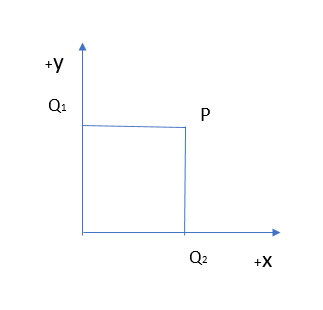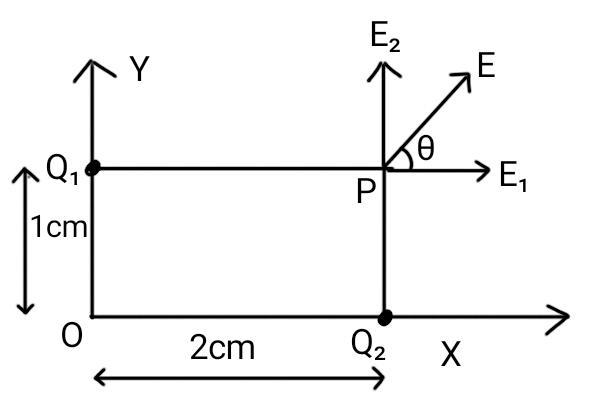Question
Question: Two-point charges \(Q_1=2\mu C\) and \(Q_2=1\mu C\) are placed as shown. The coordinates of the poin...
Two-point charges Q1=2μC and Q2=1μC are placed as shown. The coordinates of the point P are (2cm,1cm). The electric intensity at P subtends an angle θ with the positive X axis. The value of θ is given by:
A.tanθ=1
B.tanθ=2
C.tanθ=3
D.tanθ=4

Solution
Hint: The electric field at a point due to a point charge separated at a particular distance. Then, after calculating the fields for two different charges, we can find the direction of the resultant electric field. So, the value of θ can be found.
Formula used: E=4πϵ01.r2q
Complete step by step solution:
The electric field due to charge q at a distance of r is given by,
E=4πϵ01.r2q
Now, we will find the electric field for the charge Q1 and then the field for the charge Q2. The first field will be denoted by E1 whereas the second one will be denoted by E2. Now, if θ be the angle as shown in the picture, then the value of tanθ is given by E1E2 .
The point P has the coordinates (2cm, 1cm). So, it is at a distance of 2 cm from Q1 and at a distance of 1 cm from the charge Q2.

For the first field, we can see that the charge is Q1=2μC. And the distance from charge Q1 is 2 cm. So, the electric field is given by,
E=4πϵ01.22Q1=4πϵ01.42
Similarly, for the second field, the charge is Q2=1μC. And the corresponding distance is 1cm. So, the field is,
E=4πϵ01.121
After making E1E2 we find that,
tanθ=E1E2=2
So, option B is the correct answer.
Additional information:
The electric field intensity is defined as the force felt by a unit positive charge placed at the point of interest. It is actually the number of lines of force per unit area. The unit of the electric field is volt per meter. In the used formula, ϵ0 is called the permittivity of free space.
Note: If the angle were not with x axis but with the y axis, then the value of tanθ would be E2E1. Put the correct charge with the corresponding distance in the formula. While taking the ratio of two same quantities, make sure to keep them in the same unit.
